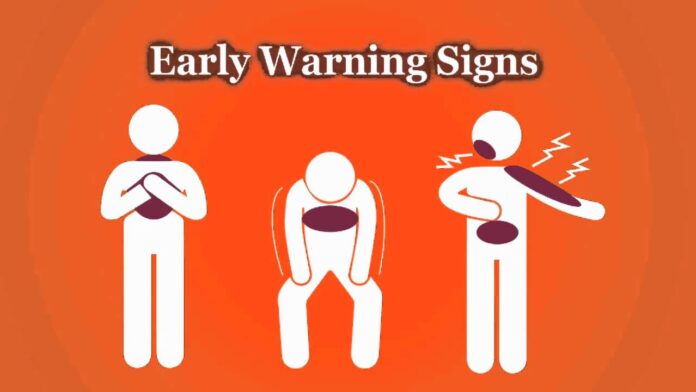Early signs of a heart attack include chest pain or discomfort, shortness of breath, nausea, light-headedness, and pain in the jaw, neck, or arm. Prompt recognition and immediate medical attention are crucial for effective treatment and better outcomes.
Myocardial infarctions, commonly known as heart attacks, are severe emergency conditions that arise when blood supply to a section of the heart is restricted for a prolonged period, leading to heart muscle injury. It is important to know the symptoms of a heart attack so that you can get help as soon as possible. This blog focuses on the early signs of a heart attack, how they can be recognised, and the need to seek medical help. Knowledge of these signs can enable you to respond appropriately and in time, which can be a life saviour.
What is a Heart Attack?
A heart attack is a condition in which one or more of the coronary arteries supplying the heart muscle oxygen-rich blood is blocked. This blockage is normally a result of the accumulation of plaque, a substance made of fat, cholesterol, and other materials, in the coronary arteries. When the plaque bursts, a blood clot is created and this blocks the blood flow. If the oxygen supply is cut off, the heart muscle starts to die.
Early Signs of a Heart Attack
It is important to know the symptoms of a heart attack in its initial stage. Although symptoms may differ, there are some early signs that should not be overlooked. Following are some of the early signs of heart attack:
- Chest Discomfort: Most heart attacks cause pain in the middle or left side of the chest. This may be described as a sensation of pressure, squeezing, feeling full or even pain. This sensation is not for a few minutes only or may be intermittent.
- Upper Body Discomfort: Pain can radiate to the arms, back, neck, jaw or stomach. This is more frequent in women but can also be seen in men.
- Shortness of Breath: Shortness of breath can be present with or without chest discomfort. A person may feel like he/she is suffocating even when they are idle.
- Cold Sweats and Nausea: Palpitations, cold sweats, nausea, and dizziness are some of the early symptoms of a heart attack.
- Extreme Tiredness: Fatigue for no reason, sometimes for days, can be a symptom of a heart attack, particularly in women.
- Feeling Anxious: Panic, anxiety, or the feeling that something bad is going to happen can also be an early sign of a heart attack.
For expert cardiac care, consult Dr Amit Mittal, one of the best cardiologists in Delhi.
Risk Factors Associated with Heart Attacks
- Age and Family History: Age, particularly over 45 years in men and over 55 years in women, and a family history of heart disease increase the risk.
- Lifestyle Choices: Heart disease could be a result of smoking, poor diet, lack of exercise, and excessive consumption of alcohol.
Preventative Measures to Avoid Heart Issues
For better heart health, following the steps given below can help:
- Healthy Lifestyle: Some of the measures that one can take to prevent heart issues are — eating a balanced diet, exercising, avoiding smoking, and taking moderate amounts of alcohol.
- Regular Check-ups: It is advised that people should go for check-ups often so that the health of the heart can be monitored and if there are any problems, they can be identified early.
When to Seek Medical Help?
In case of a heart attack, immediate action is required and they are:
- Call Emergency Services: If you or any other person has any of the symptoms mentioned above, call the emergency services.
- Chew Aspirin: It is advisable to chew aspirin in order to prevent blood clotting.
Diagnosis and Treatment for Heart Attack
To diagnose heart attacks, the following tests and procedures are done:
- Electrocardiogram (ECG): This test measures the electrical activity of the heart and is helpful in identifying a heart attack.
- Blood Tests: These can identify enzymes that are released in the bloodstream when the cardiac muscles are injured.
- Imaging Tests: Chest X-rays, echocardiograms, and CT scans are physical examination techniques that provide clear images of the heart and chest.
To treat heart attack, a cardiologist may follow a combination of the given treatment options:
- Medications: Drugs like aspirin, thrombolytics, and anticoagulants help dissolve blood clots and improve blood flow.
- Angioplasty: This is a treatment method that entails opening the blocked blood vessels by using a balloon and a stent.
- Surgery: Coronary artery bypass grafting (CABG) is a surgical process that creates a new path for the blood flow to the heart.
Post-heart Attack Care
It is crucial to follow strict post-care to manage and recover from a heart attack. Following are the post-heart attack care regime:
- Diet and Exercise: Diet and exercise are the most important things that a heart patient needs to adhere to in order to get better.
- Medication Adherence: Compliance with the medications that have been recommended by the health care provider.
- Rehab Programmes: Some of these include exercising under supervision, educating the patient on the right diet and exercise regime, and stress management.
Recognising the early signs of a heart attack and taking swift action can significantly improve outcomes and save lives. Being aware of symptoms such as chest discomfort, shortness of breath, and upper body pain can prompt timely medical intervention. Maintaining a healthy lifestyle, managing risk factors, and seeking regular medical check-ups are essential for heart health. If you suspect that you or someone else is having a heart attack, do not hesitate to call emergency services immediately.
For comprehensive cardiac care and expert advice, book an appointment through Apollo with Dr Amit Mittal, one of the best cardiologists in Delhi.







